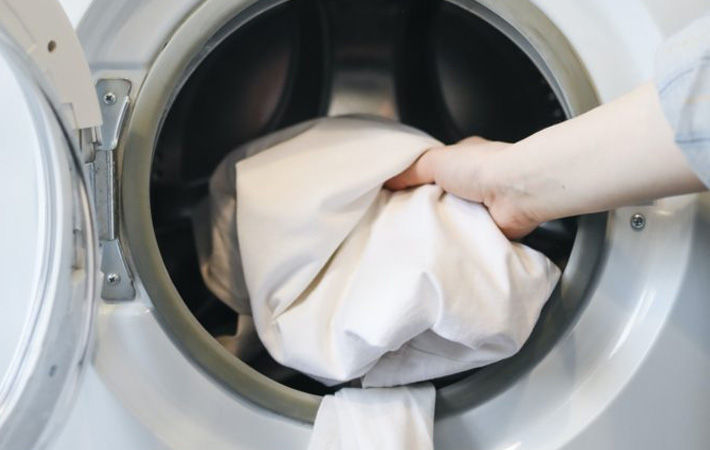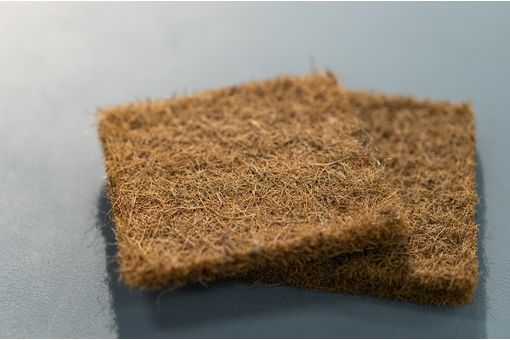Interviews
Lithuanian scientists produce energy from lint-microfibres
24 Jun '21
3 min read

Pic: Kaunas University of Technology
Lithuanian scientists have developed a process to convert lint-microfibres, collected from clothes dryers, into energy. They have constructed a pilot pyrolysis plant and also estimated by mathematical modelling that by converting lint microfibers from one million people, almost 14 tons of oil, 21.5 tons of gas and nearly 10 tons of char could be produced.
The research has been carried out by a team of scientists from Kaunas University of Technology and Lithuanian Energy Institute.
Each year, approximately 80 billion pieces of clothing are consumed globally, and approximately €140 million worth of it goes into landfill. This adds to large amounts of emissions, causing environmental and health problems. One of the ways to lessen the footprint of consuming clothes is to reduce the laundry impact. During machine-washing, around 300 mg of microfibres are generated from one kg of textile.
“Lint-microfibres are classified as microplastics. Whereas large plastic items can be sorted out and recycled relatively easily, this is not the case with microplastic – tiny plastic pieces, less than 5 mm in diameter. Large quantities of microplastic are being washed down our drains and enter our seas threatening the environment,” says Dr. Samy Yousef, senior researcher at Kaunas University of Technology (KTU), Faculty of Mechanical Engineering and Design.
Yousef has led the research carried out by the inter-institutional team, which developed an eco-friendly technology to extract energy products from textile waste. Lint-microfibres were collected from the filters of the drying machines in the dormitories of KTU. As the residents of the dormitories come from different cultures in Europe, Africa, Asia and America, the collected samples were very diverse. Using a pilot pyrolysis plant, built at the laboratories of Lithuanian Energy Institute, the scientists were able to extract three energy products – oil, gas and char – from the collected lint-microfibre batches. When treated thermally, the lint-microfibres decompose into energy products with around a 70 per cent conversion rate.
“When we think about textile waste, we usually imagine long fabric with high crystallinity, which is contaminated with dye and dirt. Much energy is needed to turn the solid waste into liquid. However, lint-microfibre is a somewhat ‘broken fibre’ textile waste; it has a uniform size and shape, contains a lot of flammable compounds (resulted cotton and polyester elements), its transformation is easier,” says Yousef.
Researchers also developed a mathematical model to evaluate the economic and environmental performance of the suggested strategy, based on the lint-microfibres generated by 1 million people. The study shows that if applied on an industrial scale, the strategy is profitable and eco-friendly.
“I believe that the collection system, similar to deposit-return for drink containers, could be developed based on our research. A household would bring the lint-microfibre from their drying machine filters to a collection point and receive some kind of compensation for it. We have proposed the technology and made calculations, which may be developed further,” says Yousef.
The scientists say that lint-microfibres can be considered a renewable energy source that ensures sustainability and accelerates the transition of the textile industry to a circular economy. Yousef and his research group have also developed other green/eco-friendly technologies to extract cotton, glucose, and energy products from textile waste and end-of-life euro banknotes using mechanical, thermal, chemical, and biological treatments.
The project has been funded by the Research Council of Lithuania. The study has been published in Science of The Total Environment.
The research has been carried out by a team of scientists from Kaunas University of Technology and Lithuanian Energy Institute.
Each year, approximately 80 billion pieces of clothing are consumed globally, and approximately €140 million worth of it goes into landfill. This adds to large amounts of emissions, causing environmental and health problems. One of the ways to lessen the footprint of consuming clothes is to reduce the laundry impact. During machine-washing, around 300 mg of microfibres are generated from one kg of textile.
“Lint-microfibres are classified as microplastics. Whereas large plastic items can be sorted out and recycled relatively easily, this is not the case with microplastic – tiny plastic pieces, less than 5 mm in diameter. Large quantities of microplastic are being washed down our drains and enter our seas threatening the environment,” says Dr. Samy Yousef, senior researcher at Kaunas University of Technology (KTU), Faculty of Mechanical Engineering and Design.
Yousef has led the research carried out by the inter-institutional team, which developed an eco-friendly technology to extract energy products from textile waste. Lint-microfibres were collected from the filters of the drying machines in the dormitories of KTU. As the residents of the dormitories come from different cultures in Europe, Africa, Asia and America, the collected samples were very diverse. Using a pilot pyrolysis plant, built at the laboratories of Lithuanian Energy Institute, the scientists were able to extract three energy products – oil, gas and char – from the collected lint-microfibre batches. When treated thermally, the lint-microfibres decompose into energy products with around a 70 per cent conversion rate.
“When we think about textile waste, we usually imagine long fabric with high crystallinity, which is contaminated with dye and dirt. Much energy is needed to turn the solid waste into liquid. However, lint-microfibre is a somewhat ‘broken fibre’ textile waste; it has a uniform size and shape, contains a lot of flammable compounds (resulted cotton and polyester elements), its transformation is easier,” says Yousef.
Researchers also developed a mathematical model to evaluate the economic and environmental performance of the suggested strategy, based on the lint-microfibres generated by 1 million people. The study shows that if applied on an industrial scale, the strategy is profitable and eco-friendly.
“I believe that the collection system, similar to deposit-return for drink containers, could be developed based on our research. A household would bring the lint-microfibre from their drying machine filters to a collection point and receive some kind of compensation for it. We have proposed the technology and made calculations, which may be developed further,” says Yousef.
The scientists say that lint-microfibres can be considered a renewable energy source that ensures sustainability and accelerates the transition of the textile industry to a circular economy. Yousef and his research group have also developed other green/eco-friendly technologies to extract cotton, glucose, and energy products from textile waste and end-of-life euro banknotes using mechanical, thermal, chemical, and biological treatments.
The project has been funded by the Research Council of Lithuania. The study has been published in Science of The Total Environment.
Fibre2Fashion News Desk (SV)
Popular News
Leave your Comments
Editor’s Pick
































-Ltd..jpg?tr=w-120,h-60,c-at_max,cm-pad_resize,bg-ffffff)





.jpg?tr=w-120,h-60,c-at_max,cm-pad_resize,bg-ffffff)
.jpg?tr=w-120,h-60,c-at_max,cm-pad_resize,bg-ffffff)






